You are here
The State of Education in Catalonia. Priorities and Proposals Following the Catalan Education Law (LEC)
About the speaker
Ferran Ferrer, Ramon Farré, Ramon Plandiura
Ferran Ferrer is professor of Comparative Education at the UAB and director of 'The State of Education in Catalonia. Annual Report 2008'. Ramon Farré is secondary school teacher and former Secretary General of Teaching (1999-2003). Ramon Plandiura is lawyer and lecturer at the UPF.
Ferran Ferrer
Main conclusions drawn from the study 'The State of Education in Catalonia. Annual Report 2008'
• In the decade since 2000 we have progressed in designing a model of education for Catalonia (without completely abandoning the Spanish model, as has occurred in other countries such as Belgium, Canada and Germany, where different types of educational model coexist).
• Education has come to occupy a more central position in political and social debate and it has a greater media presence.
• In general, the same problems that were identified in the last Annual Report (2006) continue to exist. These are poor results at the end of primary and secondary; high repetition rates; low graduation rates (even these data are worse than in some other parts of Spain); different results according to social class, between Catalan students and immigrants, and also between public and semi-private schools.
• Hostility of teachers towards the education administration and society.
• The challenge of immigration in Catalonia is still unresolved. It is not clear what it means for this group of people to be integrated into the system. There is also the added problem that this is the group that generally obtains the poorest results at school.
What should be done to overcome the existing problems?
• Education policy must have an overall view of the system. For example, problems in secondary school are not only resolved with measures in secondary school.
• Political time (marked by the elections every 4 years) is not pedagogical time.
• Education measures need to be applied over time and we need to wait for the results.
• Consensus is needed in decision-making. It would be better to move forward slowly but in agreement.
• Stability and continuity in planning and consistency in decision-making.
• Decision-making must be based on experience and research. 'In this country, we keep reinventing education every day. In other areas this does not happen', says Ferran Ferrer.
Some questions on the LEC and how it should be applied:
• The decree-laws to put the LEC into force must be consistent with this law. If the law is based on an agreement on education, the decree-laws must reflect this consensus.
• In the LEC there is an excessive tendency towards regulating standard practice. It is the broadest education law that has been introduced in Catalonia. 'It would appear that there is no confidence in the actors that have to put it into practice and the legislation is to keep them within the legislative framework. It is contradictory that a law that aims to increase autonomy should also be so highly prescriptive', says Ferrer.
• During the introduction of the LEC, the agents must feel that they are involved and that they have a say.
• This law again demonstrates that on some issues, regulations and reality diverge. For example, the law says that secondary students cannot be grouped by levels, whereas the PISA report shows that 30% of students that took the tests went to schools where there were level-based groups.
• Public and semi-private schools must collaborate. The problems of the Catalan education system affect both networks and they must work together. “I have the impression that in the past there was more collaboration”, says Ferrer
• To enable us to improve the education system, an assessment of the system is needed. And this assessment must be independent of the public administration. We need viewpoints that are removed from education politics.
Ramon Plandiura
Some questions on the LEC and how it should be applied.
Is it a starting point or a destination?
It is a starting point and a turning point (with its own positives and negatives). The other education laws have been controversial and this one has been founded on agreement. It means a change in the structure of the system, in that it:
1. Reformulates the double network.
2. Sets the basis for changing the public schools, even in aspects such as ownership.
3. Gives the public administration a new role.
Should schools have greater autonomy?
The LEC sparked a debate about whether regions or schools should be granted greater autonomy. Finally it was decided to give more autonomy to the schools. I think this means that the schools will have more resources for resolving their problems, for finding different solutions.
The role of the school management and leadership
There is a sensation that the management does not have the support of the owner of the school. This support is necessary but it is also necessary for those teachers who want change to become involved.
Is assessment necessary?
No one assesses laws. One part of a regulation is useless; another part is copied from past regulations; another part is badly drafted and brings legal conflicts; and only a small part is applied with good results.
Thus assessment is essential to improvement. Good systems are the ones that are assessed to enable improvement. However, a precondition is the total reliability of the assessing bodies.
Assessment must be used to improve, not to compete. It must be used to demand more resources if they are necessary.
The role of teachers
For a long time there has been a breakdown in the relationship between teachers and the public administration; we have gone on too long with discontented staff without anything happening. We need to improve the atmosphere of trust.
How will the autonomy of the schools affect the education administration?
'I would ask this question the other way around. How will the education administration change the autonomy of the schools?’ says Plandiura. During the development of the law, we could see that the administration does not want to take charge of the management of its schools. Discussions have covered creating consortiums to take charge of the management and creating new instruments for managing the schools. At the same time, the school managers also say that they do not want to be the owners of the schools. Without everyone's involvement, the problems will not be resolved.
Incentives for leadership
Teachers need to get involved and they need management and leadership skills
Assessment of the teaching career
Assessment is needed but it must be done properly. Management reports must be taken into account but assessment must be external so that it is impartial.
Ramon Farré
Some questions on the LEC and how it should be applied.
Is it a starting point or a destination?
It is a starting point and a destination too. This is the first time that an education law has a lot of support, but at the same time it is a law that has imitated the Spanish law. It is also a law that has multiplied the number of rules. Moreover, it is a law that has not been finalised because it depends on various appeals brought before the Constitutional Court (including the appeal against the Catalan Statute of Autonomy) that could still change it in the future.
But as it is a law with general agreement, we should not re-open controversies and we should get to work. Following the LEC we must focus on the schools. Following the LEC we should say 'Silence please, people are working'.
And what we must do urgently is determine what resources are available (at this time there are few) and decide what the priorities are and how the resources should be applied. We must talk about education, not politics. With the resources we have, what will we do and in what order.
Is assessment necessary?
I do not want assessment if they don't tell me what will done afterwards to resolve the problems detected by the assessment. We already know that there are things that don't work. For example, we can detect reading and writing problems, but what can we do about them when we have a group of 27 children in the classroom? What can we do if there are not enough teachers?
Should schools have greater autonomy?
Other laws already spoke of autonomy and nothing has been done. Autonomy makes the administration more bulky. What is needed is for the administration to be at the service of autonomous bodies.
Assessment of the teaching career and leadership
It is difficult for school managers to achieve change with just leadership. Unless they can really decide on staffing policy, there is not much they can do. But at the same time, the role of management is a huge responsibility. That is to say that the managers have responsibility, they must lead, but they lack the tools.
Assessment must be used to improve. Teachers must be supported and the assessment must have credibility. Teachers must understand the assessment as at tool to help them.
How will the autonomy of the schools affect the education administration?
The autonomy of public schools is very limited. They do not have their own legal personality and moreover, the civil service system also limits autonomy. The management cannot establish an autonomous model if the personnel are selected outside the centre and they cannot choose which staff they would like to work with.
Must the assessment of schools be made public?
For the present, public assessments of the schools are made. People choose one school or another based on references from other people, from what they say the schools are like. But this is an assessment without a scientific component. I believe we need an assessment that follows objective scientific criteria and that is made public.
Discover
other ideas
-

The Influence of Origin and Destination Countries...
Jaap Dronkers
2010 -

Decline of Schools and Conflicts of Principles
François Dubet
2010 -

Perennial Dilemmas Policymakers and Practitioners...
Larry Cuban
2010



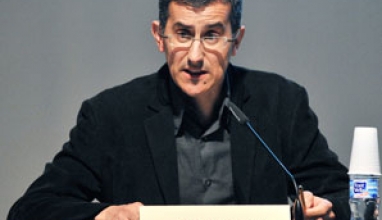
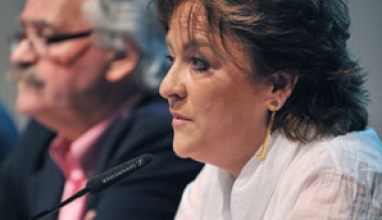

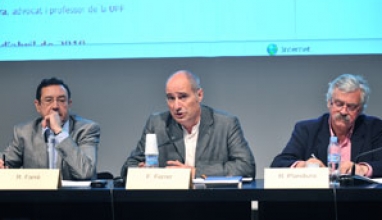
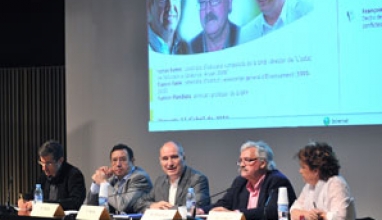
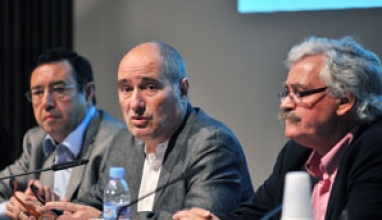

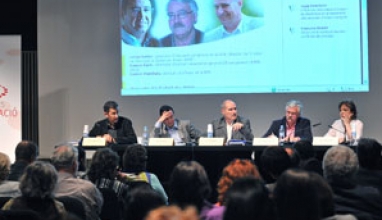

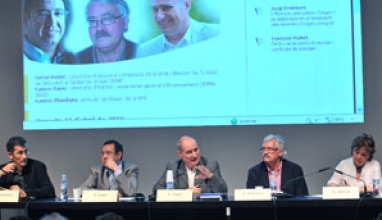



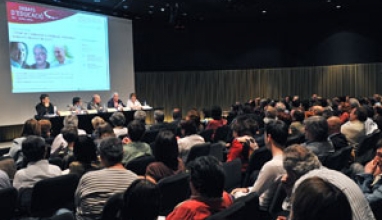




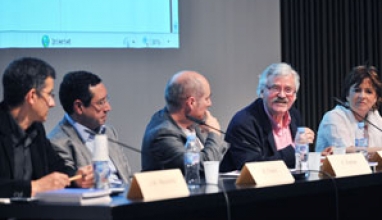
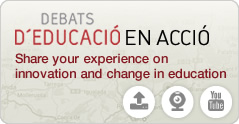
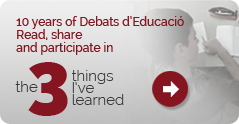

 The texts published on this website are, unless otherwise indicated, covered by the Creative Commons Spain Attribution - Non Commercial - No Derivs 3.0 licence. You may copy, distribute and transmit the work, provided you attribute it (authorship, journal name, publisher) in the manner specified by the author(s) or licensor(s). You may not use the material for commercial purposes. You may not transmit any derivative work from this material. The full text of the licence can be consulted here:
The texts published on this website are, unless otherwise indicated, covered by the Creative Commons Spain Attribution - Non Commercial - No Derivs 3.0 licence. You may copy, distribute and transmit the work, provided you attribute it (authorship, journal name, publisher) in the manner specified by the author(s) or licensor(s). You may not use the material for commercial purposes. You may not transmit any derivative work from this material. The full text of the licence can be consulted here: